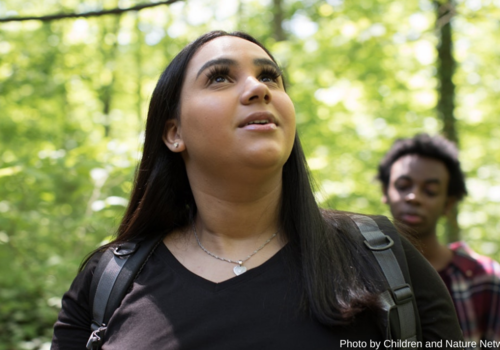
Encouragement, structure, and media management can improve children’s mental health and boost their brain development. So say multiple mental health experts, even as a mental health emergency rages on among U.S. children and teens.
Matt Miles, a high school teacher in suburban Washington, D.C., sees the crisis playing out.
“The number that’s exploding are the kids with moderate day-to-day inability to cope.” They can’t handle the pressure they used to, he says, “like two tests in a day.”
Children’s mental health practitioners are also concerned.
“We have really seen so many kids struggling—younger kids who aren’t used to the structure and behaving themselves in that structure.
But teens, especially, who have anxiety—just feeling overwhelmed because they’re faced with pressures they haven’t literally in a in a year and a half,” says Paul Weigle, M.D., a child and adolescent psychiatrist based in Connecticut.
12 Hours a Day Online
When the pandemic struck and students quickly switched to online education, they did the same for socializing and entertainment.
Kids spent more time than ever in digital pursuits—almost 12 hours on average per weekday, according to a Digital Wellness Lab parent survey.
It should come as no surprise now that students are having trouble sitting down and paying attention, observes Miles.
“They were essentially allowed a diet of candy for a whole year. Things like exercise, social interaction, critical reading, critical thinking were all missing.”
Like Miles, Joe Clement teaches high school in Fairfax County, Virginia. The two co-wrote the 2017 book, Screen Schooled: Two Veteran Teachers Expose How Technology Overuse Is Making Our Kids Dumber.
Clement worries that, now that students are back together in person, schools may be overcompensating.
“We treat our kids like they’re too fragile to do anything. If we treat them like they can’t cope and can’t study, they won’t.”
Time to Right-size
Children’s mental health professionals sympathize with parents and the pressures they have endured.
“Families were under stress, and there were lots of things that families had to do to get by during the pandemic, that are likely not things they normally would have done,” says Tami Benton, Chief Psychiatrist at Philadelphia Children’s Hospital.
Now, though, “It’s just a matter of right-sizing, and getting kids back to the kinds of activities that are healthy for them.”
“I hope that families are able to re-establish rules and boundaries that they had previously because so many kids desperately need them,” adds Dr. Weigle.
How to do that?
Understand but Don’t Enable
Realizing children have anxiety is important, but enabling them doesn’t help.
“The most important thing for parents to know about anxiety in kids is that the last thing they want to do is give in to that anxiety,” urges Dr. Weigle.
“Research shows clearly that parents who push kids to face their anxiety—to be exposed to their anxiety—those are the kids who do best.
Parents who make accommodations, who call in to school and say, ‘Timmy’s sick. He can’t make it’, or ‘He didn’t sleep well last night’, or, parents who alter their schedules to accommodate the anxiety—those are the kids who do worse.”
Children need reassurance, not worry, he adds.
“Even if you are anxious as a parent, the important thing is to not to share that with the kid and to show the child that you expect that they can handle it and they will succeed.”
Manage Device Habits
“Media use and mental health issues were on the rise well before the pandemic hit,” writes Nusheen Ameenuddin, MD, MPH, MPA, an assistant professor at the Mayo Clinic and chair of the AAP Council on Communications and Media. “What we’re seeing now is an exacerbation of conditions that existed before.”
“In the last 20 years, more and more often, a young person’s mental health issues are tied up irrevocably, for better or more often for worse, with their screen media habits,” adds Dr. Weigle, who co-chairs the American Academy of Child and Adolescent Psychiatry Media Committee.
“Screen media can be so engaging that when opportunities opened up—for family time, for in-person get togethers, for academics, for school—the screens often displace those, and young people didn’t take advantage of the opportunities they had.”
Know the New Brain Research
As teacher Miles observes in his own students, “Where they struggle is their cognitive deficiencies.”
Martin Paulus, M.D. is scientific director and president of the Laureate Institute for Brain Research. He presented new findings about child brain cognition in this webinar hosted by research convener, Children and Screens.
His team studied “Fluid Cognitive Function”—the brain’s capacity to learn, solve problems, and adapt to novel situations.
Besides a child’s socio-economic environment, Paulus found three factors affect FCF. The first: the amount of weekday screen media activity.
His discovery: “More time spent predicted lower fluid cognitive function.”
The good news: if you help your child make good choices while using devices, you also help beef up your child’s brain.
“When used in moderation and within your family values, screens can be fun, educational, and rewarding,” says Iowa pediatrician and state AAP Board Trustee Amy Shriver.
“I encourage families to check out the AAP Family Media plan to facilitate a discussion around safe screen usage for children.”
Minimize Multi-tasking
New research also shows children’s mental health may improve if they cut back on alt-tabbing between screen activities and multiple devices.
Multi-tasking was rampant during online school, homework and “always during recreational device use,” according to a Digital Wellness Lab mid-pandemic parent survey.
The habit can alter the structure of the brain and disrupt a child’s ability to concentrate, according to Jason Chein, PhD, director of Temple University’s Brain Research & Imaging Center, who also presented at Children and Screens.
Parents can help their kids with that, too.
“Give children time to be with one thing,” advises Marc Potenza, M.D., who directs the Division on Addictions Research at Yale University Medical School.
Suggestions for building a child’s focus and brain capacity:
-
Place cellphone out of sight while doing work on another device
-
Work on one device at a time
-
Work on paper
Value Reading
“If you’re multitasking when you’re reading, the students themselves are saying ‘I don’t concentrate as well’,” reports Naomi Barron, PhD, author of How We Read Now: Strategic Choices for Print, Screen, and Audio.
In her presentation to Children and Screens, Barron cited a new study from Amsterdam of 11- to 15-year-olds. The majority reported they work better in print and when they don’t multi-task.
She also found that 15-year-olds who read book-length fiction had higher reading scores than students who didn’t read fiction.
Barron’s suggestions for parents themselves:
- Model reading without multitasking
- Model reading longer works, including fiction
- Talk a lot with your children
“Media reading plus household conversation matter for language development,” says Barron.
Harness the Powers of Extracurriculars and Sleep
The second factor Dr. Paulus identified that can improve brain cognitive function is if a child takes part in extracurricular activities. Putting the emphasis on those can take the pressure off the topic of device usage.
“Rather than thinking about just limiting screen time, think about making sure that a child has enough time for a variety of healthy activities,” Dr. Weigle points out.
The third factor Dr. Paulus found that improves a child’s cognitive ability is to get enough sleep.
To achieve that, Dr. Weigle says kids need:
- Regular sleep and wake times.
- Proper sleep duration. “10 hours a day, and most kids and nine hours a day many adolescents,” advises Weigle, “which is far more than they’re actually getting.”
- Screens kept out of the bedroom. “Especially at night, but also to make sure that kids aren’t using screens in bed during the day. These are so toxic to to physical and mental health and good sleep.”
Good Questions for Children to Ask Themselves
In his new Advisory, “Protecting Youth Mental Health,” U.S. Surgeon General Vivek Murthy (whom I quote in How To Be a Durable Human), has questions kids can ask themselves about they interact with technology:
- How much time are you spending online?
- Is it taking away from healthy offline activities, like exercising, seeing friends, reading, and sleeping?
- What content are you consuming, and how does it make you feel?
- Are you online because you want to be, or because you feel like you have to be?
Toward a Durable Future
The sad reality is we parents can’t protect our kids from all stresses. That’s why they need to be more than resilient. They must be durable enough to withstand life’s ongoing bumps in the road.
To review the experts’ advice about what parents can do to help their children achieve mental health and overall durability:
- Understand, but don’t enable
- Exude confidence in their potential
- Teach healthy screen habits
- Urge them to single-task
- Foster long-form reading, especially of fiction
- Encourage a variety of activities, including:
- Exercise
- Outdoor time
- Extracurriculars
- Chores to build self-reliance skills
- Family together time, including screen-free meals
- Quiet time to think
- Prioritize screen-free sleep
You can also watch my interview with Dr. Weigle:
About the author: Jenifer Joy Madden is a Syracuse University adjunct professor of broadcast and digital journalism, a certified digital wellness instructor, founder of DurableHuman.com, and proud parent of three practicing durable humans.





Thank you for gathering these recommendations. I shared your article on Colin Family Mediation Group’ Facebook page.
Thank you very much. I hope the information is helpful to your colleagues and clients.